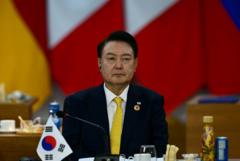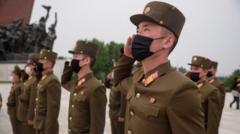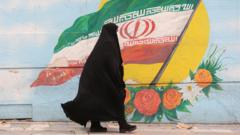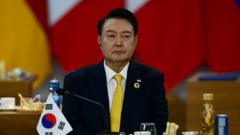South Korea's constitutional court has commenced proceedings for President Yoon Suk Yeol's impeachment following parliamentary votes amid widespread protests. With a six-month timeframe for a decision, the situation remains tense as public outcry persists and the ruling party struggles with leadership challenges.
South Korea's Constitutional Court Opens Yoon Suk Yeol Impeachment Proceedings

South Korea's Constitutional Court Opens Yoon Suk Yeol Impeachment Proceedings
As the impeachment trial of President Yoon Suk Yeol unfolds, South Korea faces a period of significant political uncertainty and societal unrest.
South Korea's constitutional court has officially initiated the trial proceedings concerning the impeachment of President Yoon Suk Yeol, whose declaration of martial law has thrown the nation into significant political chaos. Following a parliamentary vote that occurred last Saturday, which resulted from mounting protests demanding Yoon's resignation, the court now faces a six-month deadline to determine whether to affirm his impeachment or restore his presidency.
Since the impeachment, Yoon's ruling People Power Party (PPP) has encountered severe internal strife, culminating in the resignation of party leader Han Dong-hoon on Monday. As the public hearings for Yoon's trial are expected to extend for several months, observers note the pressing need for a timely resolution in order to mitigate ongoing political instability. Amidst unfolding events, protesters have pledged to maintain their demonstrations urging Yoon's removal throughout the court proceedings.
Historically, South Korea has experienced two other presidential impeachment cases where one ruling was overturned and the other upheld. The current trial's complexity is exacerbated by the court’s reduced membership, with only six of the nine justices currently seated, as three positions remain vacant due to retirements.
Should the court validate the impeachment, South Korea would be mandated to conduct new presidential elections within a tight timeframe of 60 days. In the interim, Prime Minister Han Duck-soo is fulfilling the duties of acting president. Meanwhile, Yoon has exhibited defiance regarding the martial law decision and plans to persistently contest the impeachment.
Following the court's convening, PPP leader Han Dong-hoon publicly addressed the nation, expressing his remorse for the current turmoil. Facing mounting demands from regressive factions within his party, Han had initially attempted a strategic exit to protect Yoon but shifted position after Yoon's combative rebuttal, ultimately declaring that impeachment was essential to counteract Yoon's ongoing governance.
Despite twelve lawmakers from the PPP voting for impeachment, the majority of the party shielded Yoon. In the wake of the impeachment vote, all five Supreme Council members of the PPP announced their resignations, resulting in the dissolution of the party's leadership structure. Han articulated the challenges faced by the party, declaring it "impossible" for him to continue his role, while acknowledging the heartbreak experienced by supporters but insisting he stands by his decision to advocate for Yoon's impeachment.



















